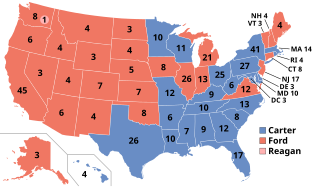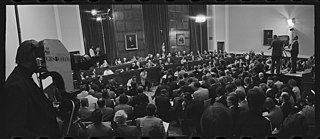
Richard Milhous Nixon was the 37th president of the United States, serving from 1969 to 1974. A member of the Republican Party, he previously served as a representative and senator from California and as the 36th vice president from 1953 to 1961 under President Dwight D. Eisenhower. His presidency saw the reduction of U.S. involvement in the Vietnam War, détente with the Soviet Union and China, the Apollo 11 Moon landing, and the establishment of the Environmental Protection Agency and Occupational Safety and Health Administration. Nixon's second term ended early when he became the only U.S. president to resign from office, as a result of the Watergate scandal.

The 1976 United States presidential election was the 48th quadrennial presidential election, held on Tuesday, November 2, 1976. Democrat Jimmy Carter, former Governor of Georgia, defeated incumbent Republican president Gerald Ford in a narrow victory. This was the first presidential election since 1932 in which the incumbent was defeated, as well as the only Democratic victory of the six presidential elections between 1968 and 1988.

The Watergate scandal was a significant political controversy in the United States during the presidency of Richard Nixon from 1972 to 1974, ultimately resulting in Nixon's resignation. It originated from attempts by the Nixon administration to conceal its involvement in the June 17, 1972, break-in at the Democratic National Committee headquarters located in the Watergate Office Building in Washington, D.C.

Harry Robbins "Bob" Haldeman was an American political aide and businessman, best known for his service as White House Chief of Staff to President Richard Nixon and his consequent involvement in the Watergate scandal.

Nixon is a 1995 American epic historical drama film directed by Oliver Stone, produced by Clayton Townsend, Stone, and Andrew G. Vajna. The film was written by Stone, Christopher Wilkinson, and Stephen J. Rievele, with significant contributions from "project consultants" Christopher Scheer and Robert Scheer. The film tells the story of the political and personal life of former U.S. President Richard Nixon, played by Anthony Hopkins.

The Saturday Night Massacre was a series of events that took place in the United States on the evening of Saturday, October 20, 1973, during the Watergate scandal. US President Richard Nixon ordered Attorney General Elliot Richardson to fire Special Prosecutor Archibald Cox; Richardson refused and resigned effective immediately. Nixon then ordered Deputy Attorney General William Ruckelshaus to fire Cox; Ruckelshaus refused, and also resigned. Nixon then ordered the third-most-senior official at the Justice Department, Solicitor General Robert Bork, to fire Cox. Bork carried out the dismissal as Nixon asked. Bork stated that he intended to resign afterward, but was persuaded by Richardson and Ruckelshaus to stay on for the good of the Justice Department.

John Wesley Dean III is an American attorney who served as White House Counsel for U.S. President Richard Nixon from July 1970 until April 1973. Dean is known for his role in the cover-up of the Watergate scandal and his subsequent testimony to Congress as a witness. His guilty plea to a single felony in exchange for becoming a key witness for the prosecution ultimately resulted in a reduced sentence, which he served at Fort Holabird outside Baltimore, Maryland. After his plea, he was disbarred.

Frank Wills was an American security guard best known for his role in foiling the June 17, 1972, break-in at the Democratic National Committee inside the Watergate complex in Washington, D.C. Then 24, Wills called the police after discovering that locks at the complex had been tampered with. Five men were arrested inside the Democratic headquarters, which they had planned to bug. The arrests triggered the Watergate scandal and eventually the resignation of President Richard M. Nixon in 1974.

Gerald Ford's tenure as the 38th president of the United States began on August 9, 1974, upon the resignation of president Richard Nixon, and ended on January 20, 1977. Ford, a Republican from Michigan, had been appointed vice president since December 6, 1973, following the resignation of Spiro Agnew from that office. Ford was the only person to serve as president without being elected to either the presidency or the vice presidency. His presidency ended following his narrow defeat in the 1976 presidential election to Democrat Jimmy Carter, after a period of 895 days in office.

The Watergate scandal refers to the burglary and illegal wiretapping of the headquarters of the Democratic National Committee, in the Watergate complex by members of President Richard Nixon's re-election campaign, and the subsequent cover-up of the break-in resulting in Nixon's resignation on August 9, 1974, as well as other abuses of power by the Nixon White House that were discovered during the course of the scandal.
This bibliography of Richard Nixon includes publications by Richard Nixon, the 37th president of the United States, and books and scholarly articles about him and his policies.

Richard Nixon's tenure as the 37th president of the United States began with his first inauguration on January 20, 1969, and ended when he resigned on August 9, 1974, in the face of almost certain impeachment and removal from office, the only U.S. president ever to do so. He was succeeded by Gerald Ford, whom he had appointed vice president after Spiro Agnew became embroiled in a separate corruption scandal and was forced to resign. Nixon, a prominent member of the Republican Party from California who previously served as vice president for two terms under president Dwight D. Eisenhower, took office following his narrow victory over Democrat incumbent vice president Hubert Humphrey and American Independent Party nominee George Wallace in the 1968 presidential election. Four years later, in the 1972 presidential election, he defeated Democrat nominee George McGovern, to win re-election in a landslide. Although he had built his reputation as a very active Republican campaigner, Nixon downplayed partisanship in his 1972 landslide re-election.
The animated science fiction show Futurama presents a satirical look at politics and current affairs in a number of its episodes. Series creator Matt Groening intended from the outset that Futurama would lampoon not only the conventions of science fiction, but elements of present-day life, serving as a form of political and social satire.
Nixon v. General Services Administration, 433 U.S 425 (1977), is a landmark court case concerning the principle of presidential privilege and whether the public is allowed to view a President's “confidential documents”. The Presidential Recordings and Materials Preservation Act, signed into law by President Gerald Ford in 1974, ordered that the Administrator of the General Services Administration obtain President Richard Nixon’s presidential papers and tape recordings. In addition, the Act further ordered that government archivists seize these materials. These archivists would preserve the material deemed historic and return to former President Nixon the materials deemed private. Furthermore, this Act stated that material that was preserved could be used in judicial hearings and proceedings. Immediately after this Act was enacted, Richard Nixon filed a lawsuit in a federal district court claiming that the Act violated the principle of separation of powers, the principle of presidential privilege, Nixon's personal privacy, his First Amendment right of association, and further asserted that it amounted to a constitutionally prohibited Bill of Attainder.

The impeachment process against Richard Nixon was initiated by the United States House of Representatives on October 30, 1973, during the course of the Watergate scandal, when multiple resolutions calling for the impeachment of President Richard Nixon were introduced immediately following the series of high-level resignations and firings widely called the "Saturday Night Massacre". The House Committee on the Judiciary soon began an official investigation of the president's role in Watergate, and, in May 1974, commenced formal hearings on whether sufficient grounds existed to impeach Nixon of high crimes and misdemeanors under Article II, Section 4, of the United States Constitution. This investigation was undertaken one year after the United States Senate established the Select Committee on Presidential Campaign Activities to investigate the break-in at the Democratic National Committee headquarters at the Watergate office complex during the 1972 presidential election, and the Republican Nixon administration's attempted cover-up of its involvement; during those hearings the scope of the scandal became apparent and the existence of the Nixon White House tapes was revealed.

Proclamation 4311 was a presidential proclamation issued by President of the United States Gerald Ford on September 8, 1974, granting a full and unconditional pardon to Richard Nixon, his predecessor, for any crimes that he might have committed against the United States as president. In particular, the pardon covered Nixon's actions during the Watergate scandal. In a televised broadcast to the nation, Ford, who had succeeded to the presidency upon Nixon's resignation, explained that he felt the pardon was in the best interests of the country and that the Nixon family's situation was "a tragedy in which we all have played a part. It could go on and on and on, or someone must write the end to it. I have concluded that only I can do that, and if I can, I must."
The president of the United States is authorized by the U.S. Constitution to grant a pardon for a federal crime. The other forms of the clemency power of the president are commutation of sentence, remission of fine or restitution, and reprieve. A person may decide not to accept a pardon, in which case it does not take effect, according to a Supreme Court majority opinion in Burdick v. United States. In 2021, the 10th Circuit ruled that acceptance of a pardon does not constitute a legal confession of guilt, recognizing the Supreme Court's earlier language as authoritative.
Richard Nixon, the 37th President of the United States, has inspired or been portrayed in numerous cultural works.
Henry Swartley "Hank" Ruth Jr., was an American lawyer who served as the third special prosecutor during the Watergate Scandal. He was appointed after the October 1974 resignation of Leon Jaworski, and served until his own resignation in October 1975. He was succeeded by Charles F. Ruff.











